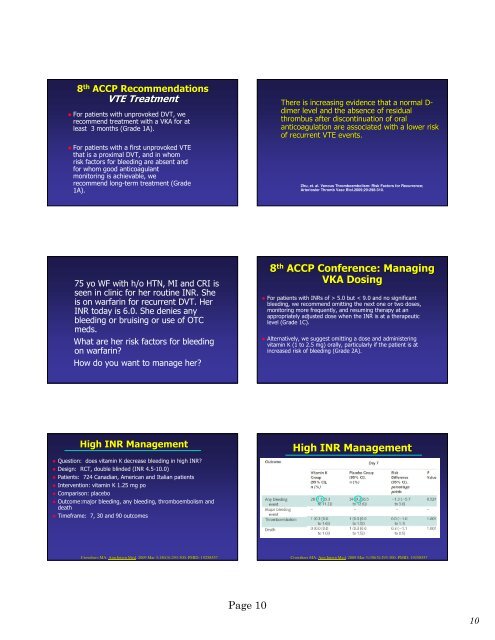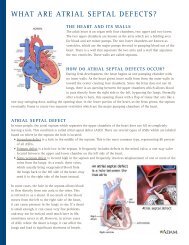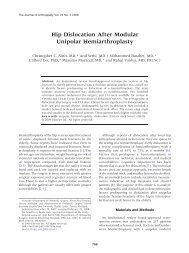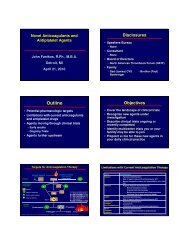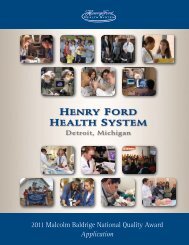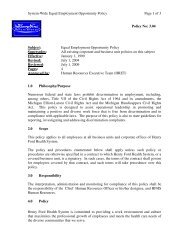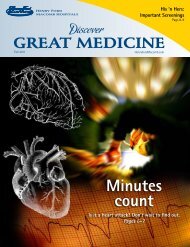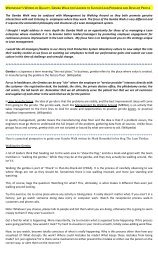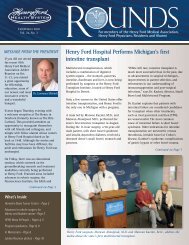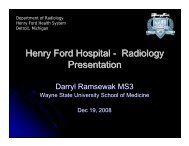Venous Thromboembolism (DVT and PE) Overview
Venous Thromboembolism (DVT and PE) Overview
Venous Thromboembolism (DVT and PE) Overview
Create successful ePaper yourself
Turn your PDF publications into a flip-book with our unique Google optimized e-Paper software.
8 th ACCP Recommendations<br />
VTE Treatment<br />
For patients with unprovoked <strong>DVT</strong>, we<br />
recommend treatment with a VKA for at<br />
least 3 months (Grade 1A).<br />
For patients with a first unprovoked VTE<br />
that is a proximal <strong>DVT</strong>, <strong>and</strong> in whom<br />
risk factors for bleeding are absent <strong>and</strong><br />
for whom good anticoagulant<br />
monitoring is achievable, we<br />
recommend long-term treatment (Grade<br />
1A).<br />
There is increasing evidence that a normal D-D<br />
dimer level <strong>and</strong> the absence of residual<br />
thrombus after discontinuation of oral<br />
anticoagulation are associated with a lower risk<br />
of recurrent VTE events.<br />
Zhu, et. al. <strong>Venous</strong> <strong>Thromboembolism</strong>: Risk Factors for Recurrence;<br />
Arteriosler Thromb Vasc Biol.2009;29:298-310.<br />
75 yo WF with h/o HTN, MI <strong>and</strong> CRI is<br />
seen in clinic for her routine INR. She<br />
is on warfarin for recurrent <strong>DVT</strong>. Her<br />
INR today is 6.0. She denies any<br />
bleeding or bruising or use of OTC<br />
meds.<br />
What are her risk factors for bleeding<br />
on warfarin?<br />
How do you want to manage her?<br />
8 th ACCP Conference: Managing<br />
VKA Dosing<br />
For patients with INRs of > 5.0 but < 9.0 <strong>and</strong> no significant<br />
bleeding, we recommend omitting the next one or two doses,<br />
monitoring more frequently, <strong>and</strong> resuming therapy at an<br />
appropriately adjusted dose when the INR is at a therapeutic<br />
level (Grade 1C).<br />
Alternatively, we suggest omitting a dose <strong>and</strong> administering<br />
vitamin K (1 to 2.5 mg) orally, particularly if the patient is at<br />
increased risk of bleeding (Grade 2A).<br />
High INR Management<br />
Question: does vitamin K decrease bleeding in high INR?<br />
Design: RCT, double blinded (INR 4.5-10.0)<br />
Patients: 724 Canadian, American <strong>and</strong> Italian patients<br />
Intervention: vitamin K 1.25 mg po<br />
Comparison: placebo<br />
Outcome:major bleeding, any bleeding, thromboembolism <strong>and</strong><br />
death<br />
Timeframe: 7, 30 <strong>and</strong> 90 outcomes<br />
High INR Management<br />
Crowthers MA. Ann Intern Med. . 2009 Mar 3;150(5):293-300. 300. PMID: 19258557<br />
Crowthers MA. Ann Intern Med. . 2009 Mar 3;150(5):293-300. 300. PMID: 19258557<br />
Page 10<br />
10


